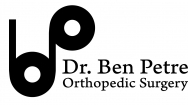Medications After Surgery
New Prescriptions: Dr Petre will provide you at least two if not more prescriptions for after surgery. These will include:
- A narcotic pain medicine (percocet, vicodin, oxycodone, etc). This medication should only be taken “as needed” for pain. You will likely have some pain after surgery, this medication will help with your pain but will likely not take 100% of the pain away. These medications last 4-6 hours, if you are not experiencing pain, do not take them as they can have side effects such as constipation, nausea, vomiting and respiratory depression. DO NOT DRIVE if you are taking narcotics.
- A blood thinner such as lovenox, aspirin or coumadin. Depending upon your risk of getting a blood clot after surgery (also called a DVT), Dr. Petre will prescribe you a blood thinner to minimize this risk. Every patient will receive TED stockings to help minimize the risk of clots, these need to be worn on BOTH legs for 2 weeks after surgery
- High risk patients (lower extremity fractures, joint replacements): Lovenox injections for 2 weeks followed by 4 weeks of aspirin 325mg daily
- Medium Risk patients (lower extremity arthroscopy or small procedures): Aspirin 325mg daily for 4 weeks
- Low Risk Patients (shoulder arthroscopy, upper extremity fractures): Early mobilization and ambulation.
- Anti-inflammatory medications: These can be added as needed for additional pain control. Routine daily use can slow down certain type of healing and daily use should be avoided in: Fracture healing, rotator cuff repairs, ligament reconstructions, meniscal repairs. Specific anti-inflammatories may be prescribed in certain surgeries such as hip arthroscopy to prevent the formation of heterotopic ossification.
- Your previous home medications: You should resume any/all blood pressure medications, heart medications, thyroid medications, diabetes medications. Please refrain from taking non-prescribed supplements or over the counter medications until 2 weeks after surgery. Please refrain from taking gout medicines or rheumatoid medicines for 2 weeks after surgery if possible.
Other prescriptions you may receive:
- Ambien: this will aid in sleep and may be prescribed for certain procedures. Only take this medicine at night if you are having troble sleeping
- Oxycontin: This is a long acting narcotic medication and should only be taken twice a day as prescribed
- Zofran: Zofran is a nausea medication that helps with some of the side effects of narcotics
- Antibiotic: If you were prescribed an anti-biotic after surgery, you should take this exactly as directed. Try not to miss any pills and take the entire prescription until it runs out.
Over the Counter Medications you may want to consider taking:
- Colace or Senna (Senna Kot): Many people get constipation from pain medicine, these medications will help with constipation
- Tylenol (acetaminophen): Tylenol is a good adjunct for pain control because it works in a different way than narcotics and anti-inflammatories. Some narcotics will have tylenol built into the pill already. If your narcotic prescription has acetaminophen, APAP, or tylenol listed on it, DO NOT TAKE ADDITIONAL TYLENOL. There is a 4000mg limit per day for tylenol in adults, it can damage your liver if you take more than this amount.
